June 7, 1981– the Jewish holiday of Shavuot is starting in a matter of hours. The entire Israeli cabinet is looking forward to a couple of days of relaxation and cheesecake, the customary Shavuot dish. (Yes, best holiday ever.) So they’re all surprised and a little annoyed when Prime Minister Menachem Begin – looking drawn, exhausted, and grave – summons them to a surprise cabinet meeting and informs them that no one’s leaving til he says so.
But their irritation gives way to shock when they learn why they’ve been called to a lock-in at the Knesset just a few hours before the holiday. Because no one had any idea that Begin had just authorized one of the most dangerous military strikes in history on a terrifying target: the nearly-functional nuclear reactor in Osirak, Iraq.
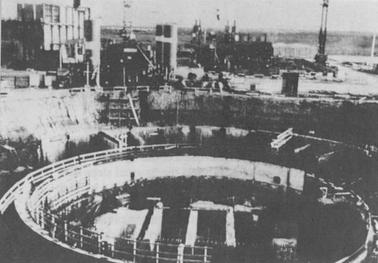
The holiday is forgotten. The prospect of cheesecake and family time goes up in smoke as the entire cabinet imagines what will happen if the mission – codenamed Operation Opera – fails.
If the Jordanians or the Saudis or the Iraqis shoot down the Israeli planes. If the planes fail to reach the reactor.
If the pilots don’t manage to destroy the reactor.
If Saddam Hussein – the scariest guy in a region full of scary guys – actually succeeds in building a nuclear bomb.
Slowly, each member of the cabinet sinks into silence, imagining the absolute worst that Saddam could do. The inferno he could unleash on Israel. The devastation he could wreak if the Israelis wound but don’t destroy his nuclear program. The fate of the Israeli pilots flying more than 600 miles through enemy territory bristling with anti-aircraft machinery and ground-to-air missiles. Not to mention the wrath of the Saudi, Iraqi, or Jordanian air forces. And what if the Israeli radar-jamming machinery fails? What if an engine decides to stop working? What if enemy pilots follow the Israelis home?
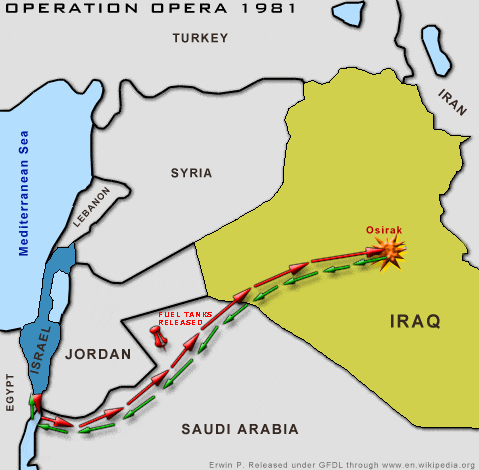
Begin, refusing to entertain the worst case scenarios, retreats to his study with his secretary, the IDF Brigadier General, and a trusted advisor.
There’s nothing left to say.
Nothing left to do.
The mission is in God’s hands now.
The only sound in the room is the racing and stuttering of four hearts.
And then… the red emergency phone punctures the silence. And whoever is on the other end has earth-shattering news. The room watches in tense silence as the brigadier general barks anxious questions into the receiver.
But then he turns to the prime minister, whose lips have been moving in silent prayer. And soon, the room erupts in jubilation, Begin clapping his hands like a child. Because the voice on the other end is the IDF Chief of Staff. And he reports that it took 90 seconds for the Israeli air force to destroy Saddam’s nuclear reactor.
And by destroy, I mean annihilate. Iraq’s nuclear ambitions have just gone up in smoke.
The conditions that led to Operation Opera
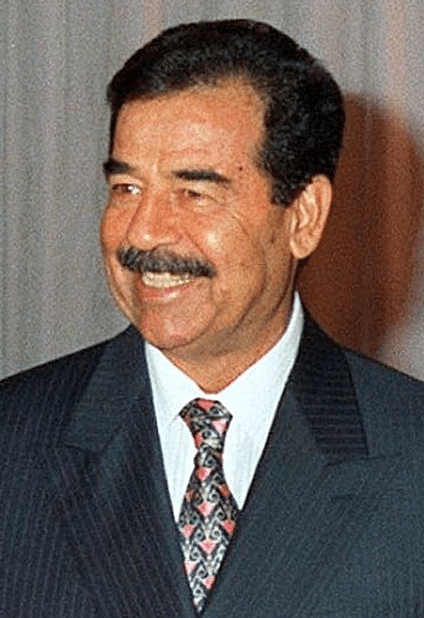
I’ve just told you a triumphant story. A simple story. Good guys versus bad guy. Israel, the underdog of the Middle East, defeated the mustached lunatic who’s been terrorizing the region for years. At this point, Saddam is one year into his eight-year war with Iran, which would eventually cost a trillion dollars and millions of lives. He’s been terrorizing the Iraqi Kurdish population, in prelude to the genocidal campaigns of the mid-to-late 80s. And he’s been blustering about his hatred of the world’s only Jewish state since joining the Ba’ath party in 1957.
In fact, in 1981, Saddam used the Iraqi state press to publish his uncle’s almost laughably antisemitic manifesto with possibly my favorite title of any book, Three Whom God Should Not Have Created: Persians, Jews, and Flies. Sample line? “Jews are a mixture of the dirt and leftovers of diverse people.” He and Pavel Krushevan would have had a field day together – and if you don’t know who I’m talking about, go back and listen to our episode on Kishinev, which explains the source of the world’s most insistent antisemitic propaganda.
So… yeah, safe to say that Saddam wasn’t a great guy. And he really didn’t like Israel. As we learned in our Gulf War episode, Iraq had sent troops to fight against the Jewish state in ‘48, ‘67, and ‘73. But the world’s fifth largest army lost to tiny Israel every time. That had to sting.
So… where’s the dilemma? How is this not a simple story of soaring triumph?
Well… war never is, is it? Because you don’t just blow up a nuclear reactor of an enemy country who has already threatened to “reduce Tel Aviv to rubble” and expect there will be no repercussions.
So… why did Begin take such a dangerous gamble?

Moral dilemmas are so much fun in the classroom, and so much less fun when running a country. You’re choosing between two bad options. So you’re making a crappy choice no matter what you choose.
Which basically sums up what it means to be the Prime Minister of Israel – the pariah of the Middle East. And the target of a lot of genocidal claims. Especially as Iraq began building up its nuclear arsenal in the 1970s.

You might remember from our Dimona episode last season that the Israeli nuclear program owed a great debt to the French. But you might also remember that by the late sixties, the French were done with Israel. After Israel had the audacity to win the Six Day War in 1967, President Charles de Gaulle turned on the Jewish state. He called the Jews “an elite people, sure of itself, and dominating.” Lovely.
So by the ‘70s, the French were cozying up to the Arab world. They stopped sending weapons to Israel. And in the biggest slap in the face of all, they sold two nuclear reactors to Israel’s mortal enemy, Iraq. The reactors had names: Isis – after the Egyptian goddess, not the future terrorist group – and Osiris. Osiris was the big one, capable of operating at a capacity of 70 megawatts. Do I know what that means? No, I don’t, but I do know that that’s big enough to process fuel for a nuclear weapon. Not that Saddam was shy about his intentions. He said explicitly, and I quote: “The search for technology with military potential is a response to Israel’s nuclear armament.” In other words, watch out, Israel. You’re not the only nuclear game in town.
The entire world seemed blithely unconcerned with the prospect of Israel’s nuclear annihilation. So Israel’s multiple intelligence agencies teamed up, wooing French and Iraqis to become informants. And from these relationships – not to mention bugged offices and telephone lines – Israel gleaned quite a bit of information. Like the layout of the facilities where the reactor was being stored. And the layout of the labs next door. But when Saddam got wind that his officials and scientists were talking to outsiders, he made them watch a real-life snuff film. Seriously. He televised his cabinet members killing their fellow government officials.
The message was clear: you talk, you die.
Still, at this point, Israel had enough dirt on Iraq to show the international community that Iraq was a legitimate threat to world peace. And – in a now-familiar plea – the Israelis begged the international community to help them stop the Iraqi nuclear program.
But all they got was radio silence.
The French had made it clear that Israel was of no interest to them – not when Iraq paid well and gave them good deals on oil. And in an embarrassing oversight for Washington, the outgoing Carter presidency had literally forgotten to brief Reagan about the Israelis’ concerns. I’m not even joking. Begin had told the Americans that things were getting bad. That Israel was prepared to do whatever was necessary to stop a genocidal antisemitic dictator from getting his hands on a nuclear bomb. But the report had somehow gotten lost as the Carter presidency transitioned out and the Reagan presidency transitioned in. Oops.
Standing up to Saddam Hussein
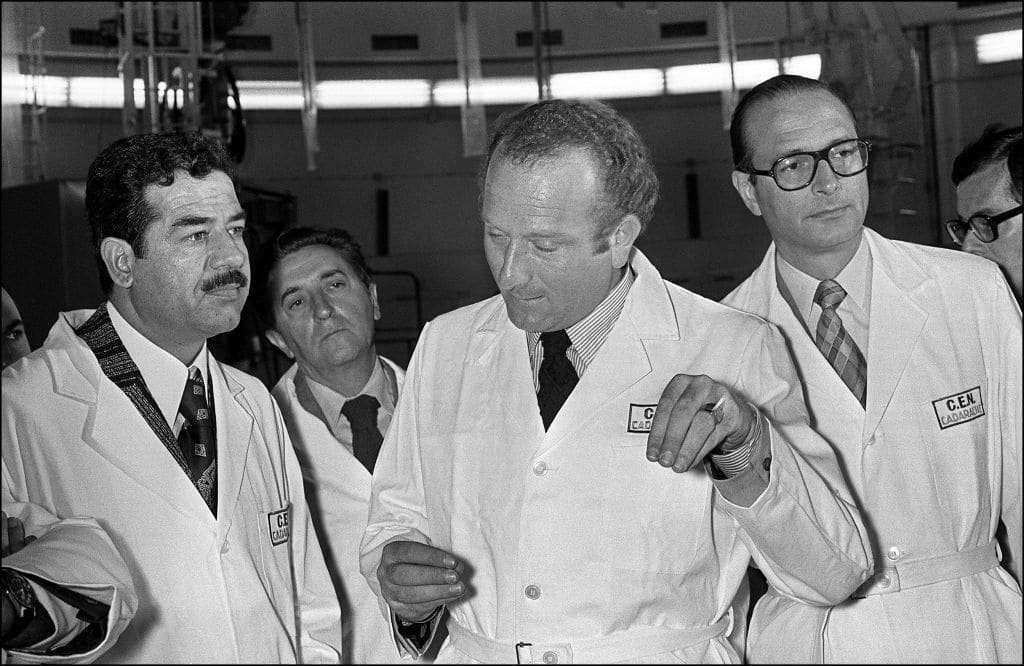
So Washington was MIA. France clearly didn’t care. And the rest of the international community responded with a combination of indifference and aggravation. After all, Israel had nukes, even if it wouldn’t admit to them. Why was it being so possessive, so insistent that no one else on the block was allowed to have powerful toys?
You and I can sum up the answer is one word: the Holocaust. But the international community didn’t seem to remember that less than 50 years before, another mustached dictator had announced his intentions very clearly. And like Saddam, he started with bluster and propaganda. (Let’s be real: he probably would have loved Saddam’s uncle’s work about how Jews are “dirt people.”)
It might seem hyperbolic to compare Saddam to Hitler. But you tell me: what’s the difference between a statement like “I will turn Tel Aviv into rubble” and “If the international Jewish financiers… should again succeed in plunging the nations into a world war the result will be… the annihilation of the Jewish race throughout Europe”?
There’s this great Maya Angelou quote that I love: “When someone shows you who they are, believe them the first time.”
Saddam was showing the world exactly who he was. And even though the international community seemed determined to keep their heads in the sand, there was one guy who refused to hide from the truth.
Who was going to stand up to Saddam and his nuclear ambitions?
That would be Israel’s prime minister from 1977 to 1983 – my friend and yours, Menachem Wolfovitch Begin. And his constant, invisible retinue of six million ghosts.
My parents are psychologists. So I know that it’s reductive to point to a single event in someone’s life and say “there. That’s the thing that made them who they are.” But I think that even my parents will agree with me that we can make a little exception for the most traumatic event in recent Jewish history: the Holocaust.
Because the prospect of another annihilation was the fulcrum of Begin’s entire life. His political career – from his time in the Irgun to his stance on German reparations to his approach to the PLO – hinged on one basic premise. Never again.
So when the Americans and the French and the U.N. did nothing to stop Saddam Hussein, Begin opened the Mossad playbook.
At first, the Mossad’s tactic to deal with Saddam was to stall. They bombed shipments of crucial material to Iraq. They killed scientists, striking quickly and in secret. Iraqi and French officials alike grew increasingly skittish.
The Iraqi scientists didn’t move without their bodyguards.
They didn’t talk to strangers, eat or drink anything suspicious, or let their personal effects out of their sight.
And yet, Mossad picked off scientist after scientist, poisoning them in secret.
Even the French technicians began to resign.
But it wasn’t enough. Remember, Saddam murdered his own people to make a point. For him, human beings were disposable. The more scientists were killed or resigned, the quicker Saddam replaced them. And finally, Begin was forced to confront the ugly truth. Saddam was both determined and brutal. To defeat him, Israel had to play his ugly game. It wasn’t enough to harry or delay, to buy a year here, six months there. Because Saddam wasn’t going to give up. To guarantee its survival, Israel needed to destroy the Iraqi nuclear reactor once and for all.
Like it or not, the Jewish state was about to go to war.
Iraq’s nuclear program
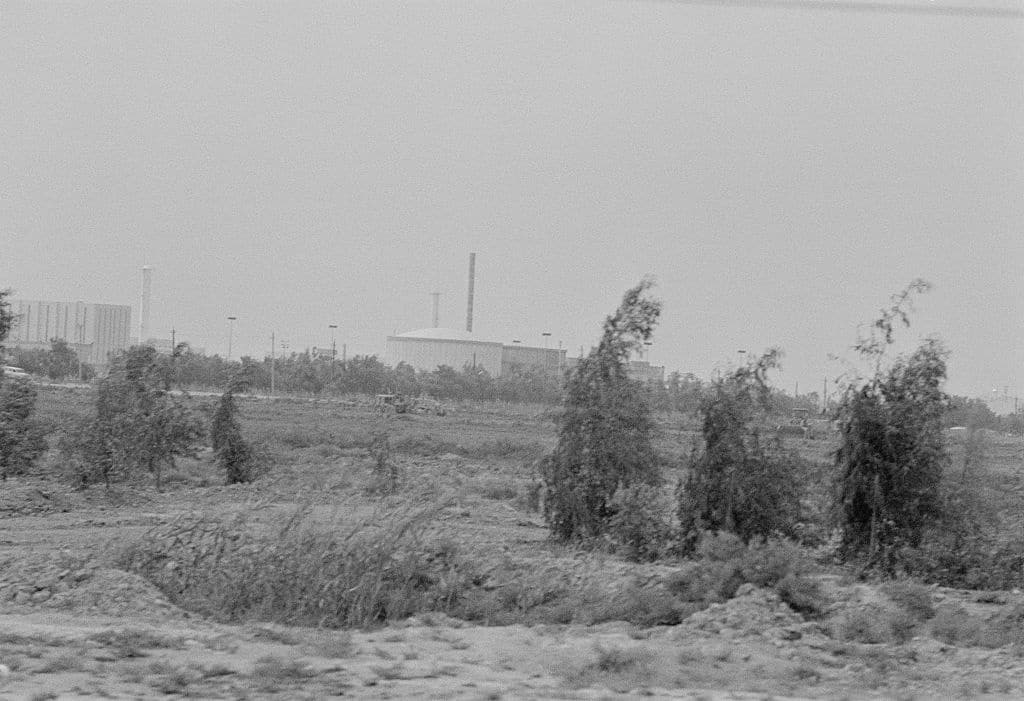
The Iraqis were crystal-clear. They would stop at nothing to achieve nuclear power. And they were not shy about taunting Israel. So Begin, agonized and worried, went to his cabinet to discuss authorizing a strike on the Iraqi reactor.
But he found himself facing stiff opposition. Top intelligence officials pointed out that if Israel destroyed the reactor now, Saddam would just start again. And this time, he’d be way more secretive. All of Israel’s painstakingly-gathered intelligence would be lost. Others feared the international reaction. Even Israel’s few allies would go ballistic if Israel poked the Iraqi bear. Not to mention Israel’s enemies in the Arab world.
Even the head of Israel’s Atomic Energy Commission thought Begin was crazy for considering a strike on Iraq. And Shimon Peres – Begin’s nemesis and leader of the opposition party – warned that attacking Iraq would isolate Israel. According to Yehuda Avner in his must read book, “The Prime Ministers,” Peres even had the chutzpah to suggest that Begin was drumming up trouble in order to look good in the upcoming elections – a suggestion that really hurt Begin, who was offended at the idea that he would ever risk the lives of Israeli soldiers just to win an election.
Politics are never pretty, but the first half of 1981 felt especially grim. Still, the prime minister had some allies in his zeal to end Iraq’s nuclear program. Minister of Defense Ariel Sharon and IDF Chief of Staff Rafael Eitan insisted that now was the only time to strike. If they waited until the reactor was fully operational, they risked unleashing a Chernobyl-style disaster on innocent Iraqis.
Letting the Iraqis just continue building nuclear weapons was out of the question. Because Begin was haunted by the millions of Israeli children under his care. By his responsibility to the Jewish people, whom he had sworn to protect. He agonized for months, carrying the burden completely alone. But, as he put it later: “No nation can live on borrowed time… For months, I had sleepless nights. What would become of our children if I did nothing? And what would become of our pilots if I did something?”

And eventually, he came to a decision – one that had probably been obvious all along, because it was the backbone of Begin’s entire worldview: “When I have to choose between saving the lives of our children or getting the approval of the Security Council and all those other fair-weather friends, I much prefer the former.”
So he sent out the planes. And within a matter of hours, the Iraqi nuclear reactor was toast and the Israeli pilots returned without a scratch.
Just in time to spend Shavuot facing the absolute tornado of international condemnation.
What happened after Operation Opera
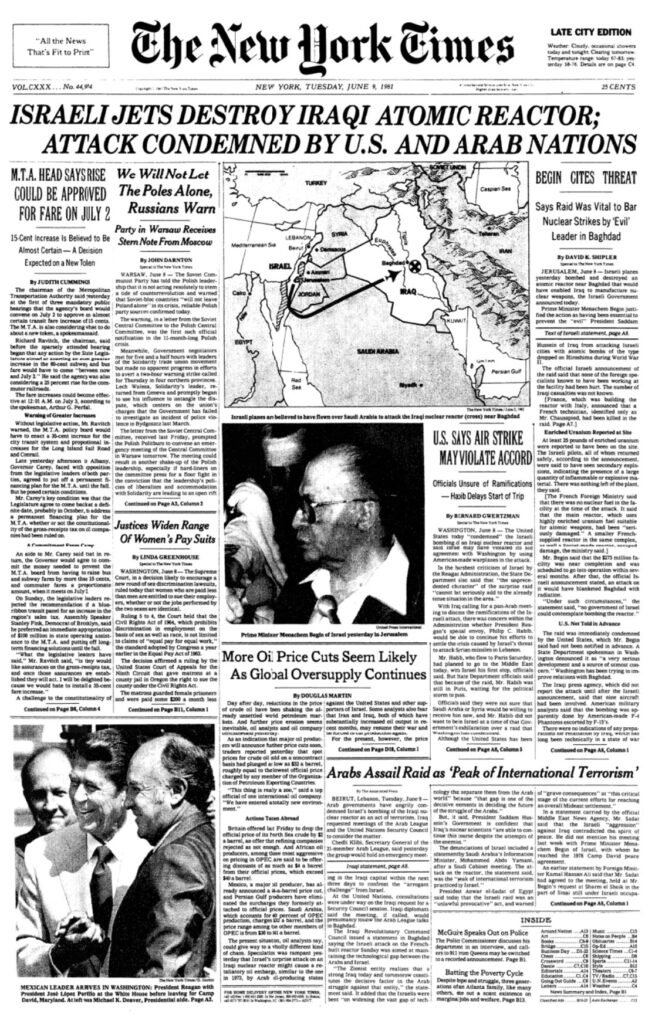
The Israelis just did something that could best be described as baller. Using exquisite intelligence they’d gathered for years, Israeli pilots flew a combined 1,200+ miles through enemy territory, at super low altitude and in radio silence, to annihilate the Iraqi nuclear reactor.
Which they did. In under two minutes. And that was it. Begin’s months of agonizing and nasty back-and-forth with his political rivals was over. He believed that Iraq’s nuclear ambitions were done for. And most importantly, he had just averted another Holocaust.
But the rest of the world didn’t quite see it that way.
The condemnations began pouring in from every corner.
In his diary, President Ronald Reagan wrote “I swear Armageddon is near.”
Reagan’s US Secretary of State, General Alexander Haig, remembers meeting with the National Security Council to formulate some kind of response:
“There was a very strong anti-Israeli condemnation mood in the room. It was really rather vitriolic,” he recalled.
The Iron Lady, the Conservative Margaret Thatcher criticized Israel’s “grave breach of international law.”
The New York Times denounced the attack as “an act of inexcusable and short-sighted aggression.”
Saddam Hussein took the opportunity to censure Israel. And the U.N. passed Resolution 487 “strongly condemning” Israel and even suggesting that “Iraq is entitled to appropriate redress for the destruction it has suffered.”
Which – I’m sorry – but I find absolutely hilarious. Saddam threatens Israel with nuclear annihilation and the U.N. expects Israel to apologize for defending itself? It’s honestly funny.
But I’m most impressed by how Begin reacted to this storm of criticism. Was he humbled? Embarrassed? Ashamed of what he had done?
Hell. No.
The Begin Doctrine
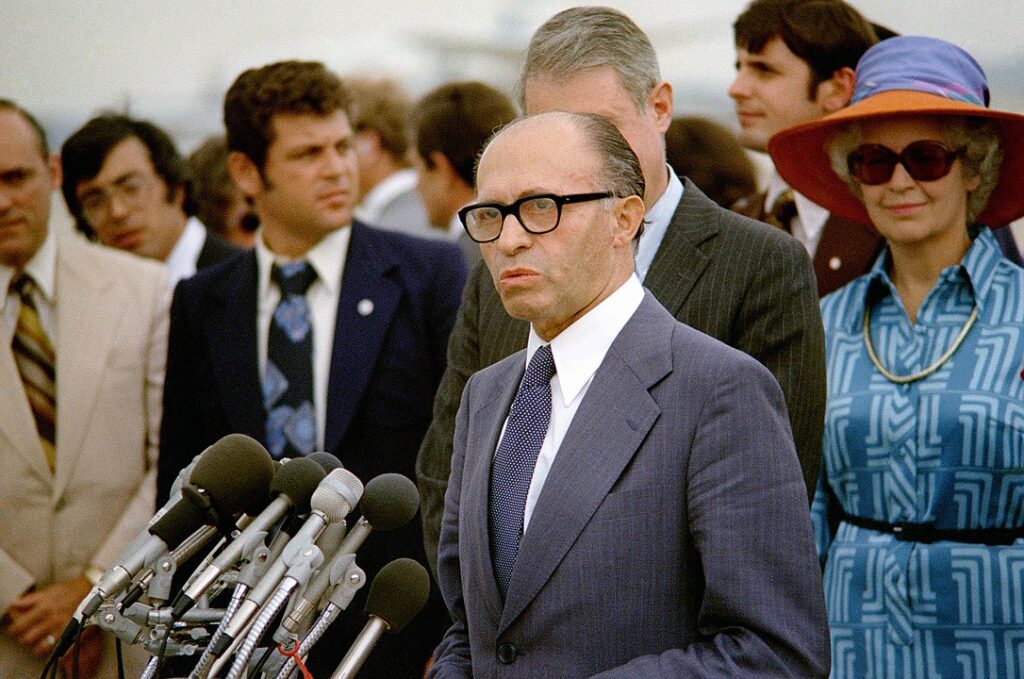
Begin’s advisor Yehuda Avner later recalled: “[Begin] fumed over what he described as Western do-gooders who never once raised a voice against Saddam Hussein’s murderous intent.” As he read out international headlines – each nastier than the last – he inserted his own sarcastic commentary. “My, my,” he said. “What a naughty boy I am.”
In short, Begin could not have cared less about what the world had to say. Because he had just established the blueprint that continues to drive Israeli policy today: the Begin Doctrine. As historian Daniel Gordis put it in a newsletter: “no enemy of Israel would ever be permitted to obtain a weapon of mass destruction.” That’s why Prime Minister Ehud Olmert took out the Syrian reactor in 2007. Why we’re constantly hearing about Israel’s so-called “shadow war” against Iran.
And it all started at Osirak. The moment that Begin gambled on a high-stakes moral dilemma. The moment that clarified and enshrined his personal mission: to keep the Jewish people safe. To ensure that “never again” wasn’t an empty platitude but a policy that the Israeli government could ensure at any cost. Including the cost of his own reputation, both at home and internationally. Including the possible cost of the brave air force fighters who took down the reactor, who flew 1200 miles through hostile airspace, certain that death dogged their heels.
But it worked. Those pilots came home safely and triumphantly, and almost immediately, Israelis lauded Begin as a hero. A month after the strike, the entire Knesset – including his enemies in the Labor party – presented the prime minister with a letter of tribute that thanked him for his bravery, his leadership, and his vision.
The end of nuclear Iraq
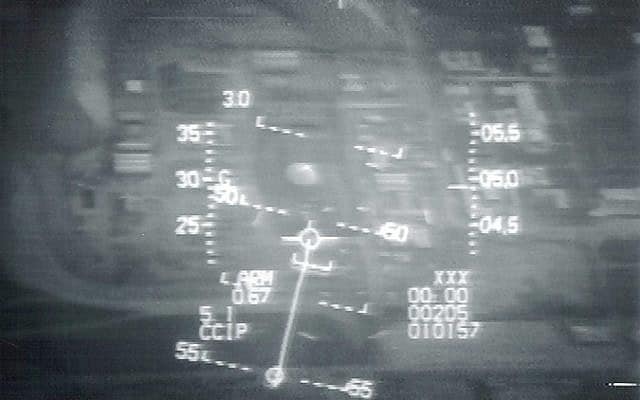
Right after the raid, Reagan’s Secretary of State Alexander Haig predicted:
“Mr. President, when history expends itself, you’ll be on your knees thanking God Israel did what it did.”
He was right. Because a decade later, the Americans entered Iraq during the First Gulf War. And according to Dick Cheney himself, they found their job much easier. Here’s journalist Rodger Claire, whose book Raid on the Sun details the Osirak campaign and its aftermath. (And so you understand, David Ivry was Israel’s ambassador to the US at the time):
Here’s the thing. The historical record is actually pretty divided on whether or not that’s true.
According to Saddam’s leading nuclear scientist, Dr. Khidir Hamza, the strike only made his boss more determined. After Osirak’s destruction, Saddam spent insane amounts of money on the equipment and materials necessary to build more weapons of mass destruction. Nukes. Bioweapons. Chemical weapons – some of which he would use on the Kurds in 1988. And this time, the dictator was desperate. He’d work with anyone. Chileans. Argentinians. Egyptians. Europeans.
So even after the incredible feat at Osirak, Israel had to get creative. Because Saddam was determined. The threat wasn’t quite contained. According to Ronen Bergman in Rise and Kill First: “The Mossad began torching the offices of the European companies involved and systematically terrorizing the scientists…” But before Israel’s most legendary intelligence service turned to Phase II – killing the scientists – the scientists dropped out. They weren’t interested in risking their lives for a guy like Saddam.
Only one guy was dumb enough to ignore Israel’s warnings.
Canadian rocket scientist Gerald Bull – who had once worked for the US military, NASA, and Israel – agreed to build Saddam a quote, “supercannon.” (Saddam had been inspired by a scifi book about a similar cannon. You can’t make this stuff up.) But Gerald Bull ignored the warnings that he’d regret working with Saddam. And in 1990, the Mossad set up shop outside of his home in Brussels. He was dead before he reached his apartment. And for good measure, pictures of his dead body were sent to his entire staff with a threatening note. Don’t go to work tomorrow if you don’t want to end up like this.
They got the message, and the supercannon project was done for.
But Saddam remained determined to build a nuclear weapon. Which the Americans learned when they invaded Iraq in 1991, to find that the dictator was only a few years away from achieving his goal.
Still. The attack on Osirak had delayed Saddam’s nuclear plans and bought the world time. A decade later, the Americans finished what the Israelis had started in 1981: the end of Saddam’s nuclear ambitions.

In 1994, Saddam’s chief nuclear scientist would defect to the west, and he confirmed what Israel had known all along: the dictator was ready and willing to use weapons of mass destruction on the world’s only Jewish state. By this point, Menachem Begin had passed away. But he died knowing full well that:
“Israel has nothing to apologize for. We decided to act now before it is too late. We shall defend our people with all the means at our disposal.”
And that is exactly what he did in June of 1981, when he made a choice that saved Israel – if not the world – from nuclear destruction.
Five fast facts
So that’s the story of Osirak, and here are your five fast facts.
- In the late 70s, Israel got confirmation that Saddam Hussein was building a nuke. The government asked anyone and everyone for help in stopping Saddam, who was very clear about the fact that if Israel had nukes, then by golly, so would Iraq. But no one seemed interested in stopping Saddam – not America, not France, not the UN. So Israel took matters into its own hands.
- At first, Israel hoped to slow production by bombing French shipments to Iraq. But Saddam insisted the French just send him more materials. So then the Israelis started assassinating Iraqi scientists. But Saddam – a brutal killer who viewed humans as disposable – just kept replacing his men.
- Despite fierce opposition from his own cabinet – not to mention his political rivals – Begin authorized a strike on the nuclear reactor. The operation, known as Operation Opera or Operation Babylon, was extremely dangerous. But the Israeli Air Force pulled it off, destroying the reactor in 90 seconds and returning home without a scratch.
- The world was furious. But Begin didn’t care about condemnations from the UN or the US or the Arab world. He was interested in one thing only: ensuring the continued safety of the Jewish people. With the Holocaust in the back of his mind, Begin vowed that no enemy of Israel’s would ever be allowed to attain weapons of mass destruction. This was known as the Begin Doctrine, and it still drives Israeli policy today.
- Begin’s leadership and foresight were eventually celebrated. All 120 members of the Knesset wrote him a letter thanking him for his vision and bravery. And a decade after the strike, when the United States attacked Iraq, Dick Cheney personally thanked the Israelis for ensuring that Iraq was not a nuclear state. The Gulf War would have looked very different if Saddam had been allowed to get his hands on nuclear weapons.
Those are the facts, but here’s one enduring lesson as I see it.
We’ve talked a lot on this show about leadership. What it means. What it costs. And we’ve also talked a lot about my massive crush on Menachem Begin, a hero of the Jewish people. But I can’t think of a better way to end this season with a reflection on the Begin Doctrine.
Begin’s raison d’etre was to ensure the continued safety of the Jewish people. That was the sole impetus for the attack on Osirak. But it had another benefit, too: a sense of psychological safety.
We’ve talked about a lot of difficult moments this season. The 1929 riots in Hebron. The Kishinev pogrom. The Farhud. The Gulf War. A dark through-line runs through all of those events: existential fear. In 1903, in 1929, in 1941, in 1991… the Jewish people were running for their lives. It didn’t matter if they were running from Russian mobs, from Arab neighbors wielding machetes, from Scud missiles. They were running because they felt unsafe. Because they truly believed that this could be it for the Jewish people. For their sense of safety in their own homes. For their dream of a state.
The Begin Doctrine tries very hard to erase that fear. To instill a sense of security. A bone-deep knowledge that home is safe. That there are no more existential threats. Nothing else that Israelis can’t face. Nothing else from which to hide.
In an excellent newsletter article from December 2021, Daniel Gordis reflects on the importance of the Begin Doctrine. The importance of a sense of safety. He points to Israel’s rank on the world happiness index. It’s #11 – three spots ahead of the USA.
Why does a tiny, constantly-harried country rank itself so high on the happiness scale? Or, as Gordis puts it: “Why are Israelis happier than most and having more kids than the rest of the developed world? Because they feel safe, and they have a sense of purpose.”
He argues that Israel owes this sense of safety to the Begin doctrine. To the knowledge that the Israeli government, the Israeli army, the Israeli intelligence services are massed against any existential threat to the Jewish state or the Jewish people. It’s a sense of security we haven’t had in 2,000 years. And it allows us to raise our heads high. To walk in the world fully confident of our place in it.
That is why Menachem Begin is one of my heroes.
And that’s also why I think the modern state of Israel is the most important and miraculous thing that ever happened to the Jewish people. Why I am proud to tell you all about Israel. The good, the bad, the ugly. Why I’ll always be honest – both about my love for this state and the pain I feel at some of their decisions.
Because I owe a large part of my confidence and my pride in my Jewishness to the State of Israel. And so do so many of us. We’re here because Israel exists. We’re strong because Israel exists. And we owe everything to the brave men and women who shouldered the moral dilemmas, fought the difficult battles, and ensured that we would always have a source of security and pride.